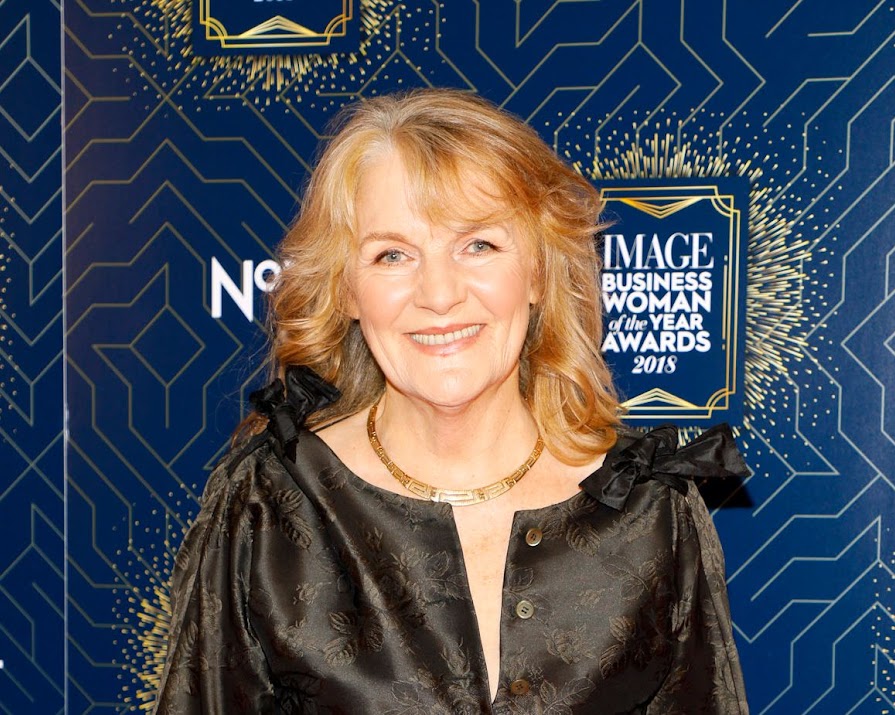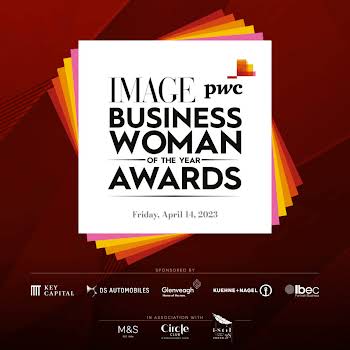
By Erin Lindsay
22nd Nov 2018
22nd Nov 2018
Former editor, freelance journalist and inspiration to working women Anne Harris was the worthy recipient of the Lifetime Achievement Award at the IMAGE Businesswoman of the Year Awards 2018. Her acceptance speech, which was met with a massive reaction both in the room and on social media, centred around her life working in publishing, the lessons she’s learned along the way, and the golden pieces of advice she has to give to those honing their careers now. Anne’s speech was a highlight of the evening, and we are so excited to share the full transcript of her words with our readers, so that everyone can benefit from Anne’s lifetime of lessons. Congratulations Anne, and thank you for your wonderful speech!
I’m a journalist. Most of you are business people. Between us, there is a reign of mutual suspicion. But we have more in common than we think. Each is enterprising, each has a responsibility towards truth, and a responsibility to other people. Editors have the added factor, like business people, of being judged on the numbers.
When we started Life magazine at the Sunday Independent, I did a column for it called “Lessons of Life”. It was something I’d always wanted to do – talk to people who had lived, not necessarily long lives (some were young), but interesting lives, and ask them what they had learned in the course of their lives. Not what they had been taught, but what they had learned; not from received wisdom, but from their own lives.
Then when I became editor and no longer had time, I decided to look over all the interviews to see was there a common theme. I didn’t expect there would – life’s not neat. But to my surprise, there was. It was about the key to happiness. Over and over, what leapt from the pages, from artists to entrepreneurs, from writers to rovers, was that the key to happiness – no prizes for guessing they didn’t say money (though a few did), and surprisingly, they didn’t say love either – the key to happiness was doing work you love. Whether it paid great wages, dividends, or not, if you loved your work, your chances of happiness were greatly increased.
And that is why this award means so much to me. Because it was as editor of IMAGE that I made that great discovery. The minute I walked in the door, I knew that chair was waiting for me. It was a defining moment. Doing work I loved at IMAGE gave me a real sense of self-worth.
So I thought I would give you my own lessons of life.
To the really serious ones first…
Related: Jenny Taffe, lessons from my cancer diagnosis: ‘I am going to enjoy every second of my life from now on’
The camera is treacherous.
Never get photographed next to someone who’s had a facelift. You think you’re doing fine – all that water and eight hours’ sleep a night are working a treat. And the person with the face-lift, well frankly, decidedly Joan Rivers. Then you see the photograph, and they look absolutely stunning. And you look exhausted. Wrecked – definitely in need of a holiday. Or … dare I say, a facelift.
Never apologise for fashion. Or for being a fashion victim.
It’s a life-enhancing force. When the great John Ryan – the man who keeps that bastion of free speech, Broadsheet on the road – went to cover the siege of Sarajevo for the Sunday Independent, one of his most compelling pieces was about the women of Sarajevo, who defied the siege by putting on lipstick and high heels every day as they went out to shop. What they were shopping for – their provisions, their nutrition – was so scarce, some had teeth falling out, but they had their lipstick. The desire to look good, for adornment, is a basic human impulse. The late, beautiful Emma Mhic Mhathúna, who, over a few months this summer, forced us, as a people, into confronting the savagery of her decline, of having all hope snatched away, told Miriam O’Callaghan that the red goddess dress she wore to the High Court was an important statement. Sadly, it turned out to be one of her few little victories.
And if you’re still apologising, remember, philosophers say fashion is as important a cultural transaction as music or movies for defining the spirit of an age.
Always collect your own dry cleaning.
In other words, no matter how high up the pecking order you go, stay grounded. I had a friend who was CEO of a very successful chain of shops. Life was wonderful, there were PAs who did her bidding – after all, her time was precious. A crash came, the bank foreclosed, the shops were no more, and the direct debits disobeyed. The thing that was most humiliating, she told me, was she had forgotten how to pay her electricity bill, tax her car – we won’t even go into the intricacies organising her own Sky broadband account. It made the fall so much more painful. Don’t delegate everything, especially not the personal stuff. Always pay your own bills.
Never ask anyone to do something you wouldn’t do yourself.
This is my way of saying, check your privilege. Many of you here are at a certain level in your careers, and you’ve earned that position. You feel that “privilege” had nothing to do with it. But the truth is, once you’ve reached a certain level, you are privileged, because invariably there is a power that goes with the position.
Memory is a tricky faculty, and the hardest thing to remember when you have a little bit of power is what it’s like to have no power. We very quickly forget what it’s like to be starting out, to be alone and friendless in the workplace. And if we doubt that, did we ever think that the day would come, when to have a roof over your head in Ireland would be a privilege. At every level, it’s getting harder and harder to achieve life’s ordinary goals.
That’s why a handy way of keeping your privilege in check is, never ask anyone to do something you wouldn’t do yourself. Delegation is great – but like statistics, too much of it becomes a hiding place. A hiding place from the truth, and above all, a hiding place from having your hands on your business. Not being hands-on leads to being out of touch. And we all know where that leads.
Three little words for a happy workplace: Keep it professional.
We’re all human. And one of the things that define us as humans is, we make mistakes. Invariably, it’s the human factor which causes problems in the workplace. Human interactions are complicated, emotions are always at play, and sometimes the personal gets entangled with the professional. And sometimes, as a line manager, you find yourself in a miasma trying to separate one from the other. But those three words – keep it professional – invariably clears a path. Especially if people know how to be professional and can get back to first principles. And always remember, if you’ve made a mistake, you are in the wrong. When you make a mistake, apologise, rectify immediately. Don’t rationalise. Don’t manipulate. Hard as this may seem, don’t, at first, try to save the situation. Face it.
Don’t fling the M word around casually.
Remember, misogyny is a gender-specific ideology. It’s hatred and mistrust of women precisely because they are women. Over my career, I would have to admit, there were times when – I am loathe to use the B word – I was badly and boorishly treated by men. This may have been neither civilised nor kind on their part, and of course, I dealt with it, but the truth is, on most occasions, the bad treatment I was exposed to was not because I was a woman, but because of actions of mine, positions I took. Men taking a similar position would be – indeed were – treated similarly. I may seem unnecessarily forensic, but these distinctions are important in the quest for equality.
And there is a subtle, but important, difference between sexism and misogyny. Sexism is behavioural, sometimes casual, sometimes deliberate, sometimes premeditated. And it is always discriminatory – of men sometimes, as well as women. But it is not always founded on hatred of women. The patriarchy is by definition sexist, so is the old boys’ culture. But is it misogynistic? Of course, it sometimes is misogynistic. But flinging the word misogyny around casually debases the currency. And it takes from the great effect of the #MeToo movement, which is going a long way to ensuring men in positions of power will think long and hard about disrespecting and abusing women again.
A good company always answers their emails.
The buzz conversations now are all about the difference between management and leadership. All the start-ups are at it. It’s like the difference between character and personality. As though one was stodgy and worthy, and the other all excitement and fun. It’s an old debate, actually. The conversations used to be about the vision thing. The vision thing more often than not got companies – and governments – into trouble. Good management is always thorough, knows the objective, knows the job and knows the personnel, down to the last. Decisions should always be fair, and should always be fast. Bad management leads to dysfunction, and my litmus test for that is organisations which do not answer emails.
Nothing more disenchanting than waiting about for decisions. Good management is honest. It should make people feel good. And it should be largely invisible, never having to say, “I am the management.” Above all, good management leads by example. Which means, of course, it feeds directly into good leadership.
Keeping your head down leads to backbone problems.
Time and again you hear well-meaning people tell those setting out on their life path – be it school, university or first job – to keep their heads down and concentrate on the job before them. Good advice. Up to a point. The problem is that it creates a risk-averse culture. As well as a cowardly one. Keep your head close to the parapet, so that you are prepared to put it above it when the time comes. Otherwise, you will have regrets, which are life’s greatest waste of emotion, and of time.
Regeneration is the name of the game.
Always surround yourself with young people. And I don’t just mean the brilliant young techno nerds we all need around us. I mean children too. They can teach us things. By the way, I don’t mean you must have children, but you must have them in your lives. We don’t have a problem accepting that animals teach us things (at least, I hope we don’t), like how dogs teach us kindness, cats teach us self-containment, but children teach us incredible things. The three Cs, to be precise: competitiveness, creativity and crumbs. And of these, the most important is the crumb. We all know that in childhood, the animal spirit of competitiveness is at its most vibrant, and this is where societal constraints have to be taught, so it doesn’t run rampant over all the other children. Creativity, quite simply, should never be constrained. But the crumb is the issue. With apologies to Jane Austen – it is a truth universally acknowledged that a child in possession of a large currant bun will, on losing a single crumb, discard the bun and chase the crumb to the ends of the earth. Well, under the table at any rate. Need I say more? We all do it at times. Lose sight of the bigger picture and tunnel under the table.
You can’t live on five easy pieces in Ireland.
(“Five easy pieces” is code for minimalism.) This is something I often felt like engraving on the walls of my office, as generation after generation of young journalists discovered the concept of minimalism. Minimalism is for the Mediterranean. You can’t lead a minimalist life in this part of the world. It’s too cold and windy and wet. We need carpets, curtains and at least three kinds of coat – winter, summer, rain, not to mention the dreaded puffa. Jumpers, cardigans, vests, thermals, and we need places to put them. And we need food – lots of it.
Never be upset when someone steals your idea.
Ideas are ten a penny. If someone steals yours, they needed it more than you did because, for you, there are hundreds more where that came from. If you’re in the right job, that is.
Parking in cities means getting your fender chipped.
Space is tight. When you bump into someone’s fender, always own up and pay for the damage – especially if nobody was looking (isn’t that the meaning of leading an impeccable life which, I presume, we aspire to?). Don’t expect gratitude – gratitude is the most difficult emotion. Expect the opposite – some might bump you in return.
Sometimes doing the right thing means it’s not just your fender is trashed, but your reputation.
And here is one of my strangest lessons of life. I would take issue with Shakespeare’s contention that “he who steals my purse steals trash. But he who steals my good name leaves me poor indeed.” Because there is one thing worse than having your good name trashed – and that is knowing that you were in the presence of wrongdoing and did nothing. That leaves you much poorer.
Don’t become a journalist if you like to be liked.
Journalism invariably offends someone. A politician is caught in a scandal; the papers report; his wife and children are totally innocent. They are offended. Of course, they are. There are three sides to every story – my side, your side, the truth, and nobody is lying. But truths, like stars, can collide. Your side may offend my side, and so on. Nobody ever said free speech was easy.
Never accept your diagnosis.
This is the one life lesson I expropriated from someone else, but I totally absorbed it, and think it’s worth passing on. I once asked an eminent physician what he thought was the secret of longevity. Don’t accept your diagnosis, he said. He made it clear he wasn’t talking about denial. He was talking about not being defined by a name or a condition. Take your medicine as a normal part of your life, not as an abnormal aspect of illness.
Posterity is a distraction.
When interviewing me for this lovely award, Melanie Morris, contributing editor of IMAGE Publications, asked me what my legacy would be. I was astonished. I had never given it a second’s thought. I just did the job to the best of my ability. My ideal in a job would be to be like the Tibetan monks with their sand mandalas. They plan, they execute the mandalas painstakingly and beautifully, but on completion, they destroy them. It is a reminder that everything on life is impermanent. Everything is impermanent. Except my beautiful 1960s Jean Muir dress, my 1970s Ossie Clark dress… Only joking. Impermanence is hard.
My final lesson. The hardest learned. Anger dies. Love doesn’t.
In the professional as well as the personal. The way to bridge that gap is respect. And more respect.
Thank you.
Featured image: Photographer Kieran Harnett























